
Dear Evan Hansen | A Coming-of-Age Epistle
A missive to the young protagonist about social media, coming-of-age pop culture and how his generation might get it right this time.
BY JULIE GARISTO | April 13, 2019
Dear Evan Hansen,
How’s life in college? Have you stopped slamming on the brake before turning the key? I hope so since it’s hard to move ahead otherwise.
I am writing to you today because I had the opportunity to see a musical production of your high school senior year, the sold-out version 2.0 of Dear Evan Hansen — a Broadway touring production — at the stately Morsani Hall of Tampa’s the Straz Center. It’s outstanding, for the most part, and if you can make it down here to see it, the final performances take place at 2 and 7:30 p.m. on Sunday, April 14. The show’s lead, Ben Levi Ross, captures you as a brilliant, sensitive young man and force to be reckoned with.
You’d also be impressed with the issues brought up in the play: the judgment and desperation of people with mental illness, the gaps of understanding between friends and family members, the false reality of social networking, and most urgently, the imperative to believe in yourself — an urgent and meaningful message for the first generation reared amidst the rapid-fire opinions of the Internet.
I also now understand why the therapist wanted you to write letters to yourself for self-affirmation (the ones that inspired the title of the musical). I can relate in some measure to your injury and your explanation of how it happened. I can relate to the confusion you felt when you were wondering who would sign your cast, and how when the class bully, Connor, signed it in big letters, it came across as an ominous, symbolic threat. I can relate to how you handled Connor’s parents’ misunderstanding of one of those “Dear Evan Hansen” letters in his possession. I feel your frustration when you can’t find common ground with your equally nerdy classmates, when one friend overcompensates with sarcasm and the other with academic ambition, both lost on their own mental trips.
A few scenes later in Act I, I rejoiced in your triumphs — when you kissed the girl of your dreams and gained popularity and confidence by bringing attention to teen loneliness and suicide via a social media campaign. In Act 2, I felt some pangs when backstories of abandonment and family secrets surface.
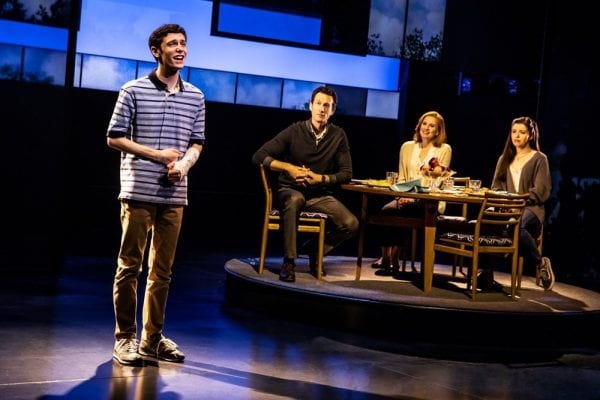
And now to address the elephant in the theater: the big lie about your pretend friendship with the deceased Connor Murphy (Marrick Smith). You barely knew him but pretend he was your best friend. While we don’t hate you for doing this, I hope you realize that others lately have received much harsher shaming for far less. You deceive the troubled teen’s family at the most harrowing time of their lives and launch a social media campaign in the boy’s honor. But it’s not without regret. Your guilt and embarrassment remind us all of a fear of exposure many of us still experience time to time in this virtual alternate reality upside-down we live in, especially those of us who work in the public eye. Perhaps, as a result, we develop an extra layer of vigilance, the way animals grow a second coat in the winter. We don’t let people into our lives as liberally as we used to, which leads to alienation, social divisions and cloying status consciousness. Even more grating are the binaries of ideology and political affiliation.
I wasn’t sure about Connor’s parents, the Murphys (played by Christianne Noll and Aaron Lazar), when they came into your life. The affluent couple made us laugh with their cheeky clueless-rich-people cliches; the mom with her self-improvement dabblings du jour and the dad’s denial of his son’s problems and loose grasp of reality, but they became sympathetic as the play goes on.

The most poignant and easiest to relate to is your mother, Heidi (Jessica Phillips), a struggling single mom who has no time and energy to deal with your problems at length. She works as a nurse’s aide and attends paralegal school. All of the grown-ups in your life perform with nuance, and their thoughtfully rendered performances somehow grabbed me across many rows of Morsani Hall, especially when they sing their heart out in breathtaking three-part harmonies.
It’s truly a delight to see how thoughtfully the play delves into the challenges of becoming an adult in the age of social media. Dear Evan Hansen doesn’t insult our intelligence — and is an utter spectacle of lighting and staging. Layered, translucent scrims frame the performance with social media posts and other images projected onto them and the stage floor. The images flash and change to the music, conveying the hectic intrusion of social media in our lives. Surprisingly, the display enhances and doesn’t detract from the storyline and tunes.
As far as the music goes, I wish I could be as enthusiastic on that note. Too many contemporary showtunes have a canned, computerized pop sound that recalls TV commercials for Mountain Dew and Mentos. Dear Evan Hansen does its tunes justice by presenting a live, cleverly silhouetted band on an elevated platform, performing on both analog and digital instruments. Still, a bigger live band with less pre-recorded material would sound much better.
Power ballads like “Requiem” — belted out with gut-socking power by Phillips — are sincerely moving. The vocal performances, by far, are more raw and powerful than the instrumentation.
By the way: did you know that Universal is making the Dear Evan Hansen The Movie? (Title improvised*) La La Land lyricists Benj Pasek and Justin Paul, who wrote the music for the show, will serve as executive producers. The star of the original Broadway production, Ben Platt, will don your signature striped shirt and arm cast.
Like life and the Internet, your story isn’t so rosy and has a tinge of cynicism — in many ways, a more sophisticated coming-of-age tale than some of the fluffy comedies I grew up.
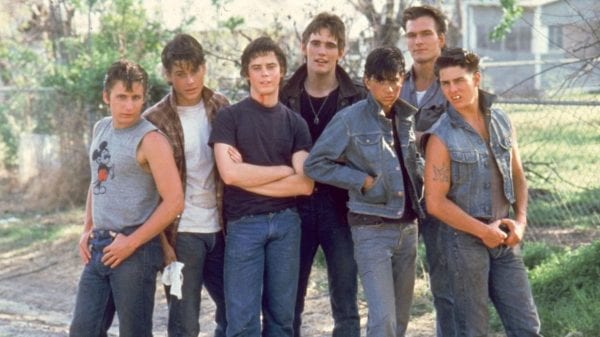
You see, I grew up, in the late 1970s and ’80s, when some of the best all-time coming-of-age tales graced the screen and pages of bestsellers. We had The Outsiders, Breaking Away, My Bodyguard and John Hughes movies like The Breakfast Club — all stories about misfits finding their mettle. In My Bodyguard, the bully helps the nerd. In your play, the bully commits suicide — a jarring turn of events that only a play in our lost-innocence times would inspire.
As I turn 50 this week, I can’t help but wonder how selfies and Facebook might have influenced me in my adolescence. If foreshadowed in a dream, social media would seem strange and apocalyptic, like the plot device of a Twilight Zone episode.
You’re traveling through another dimension, a dimension not only of sight and sound but of mind. A journey into a wondrous land of … the Internet.
I imagine this foreboding, hypothetical Twilight Zone show as predictive of technology run amok and a disturbing twist on intimacy and vanity. There would be a real woman feverishly typing away at her computer chatting with people, but the conversation runs away from her, and she becomes at odds with the computer version of her, and we wouldn’t know which is which, but one dies at the end. (Dun, dun, dun!)
Heck, the most elaborate social networking my friends and I engaged in involved intricately folded notes that we passed in math class, and that was enough to distract me from my assignments. The notes were thoughtful, illustrated and offered updates on the latest parties and bands coming to town. The best part, there was some time to throw it away if we said the wrong things. It wasn’t so instantaneous — except if some conniving twit grabbed it from the trash or a teacher read it out loud.
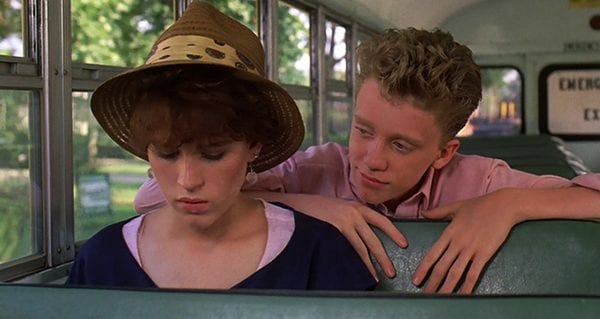
Hughes (1950-2009) created teen movies inspired by the angst of his teenage years. The films book-ended my high school years and brought the punk rock backlash of ’80s excess into the mainstream. A white middle-class staple of the decade, Hughes’ movies depicted rich, popular senior boys falling for waifish, working class girls who wore long skirts and boat-neck blouses with band buttons and smart fedoras. In Sixteen Candles and Pretty in Pink, the vindication of young heroines — ironically, played by the virtually flawless, ivory-complected Molly Ringwald — come across now (and, actually, even then) as irrationally optimistic and implausible, but we bought into them because we weren’t quite “woke” and loved celebrating oddball underdogs coming out on top.
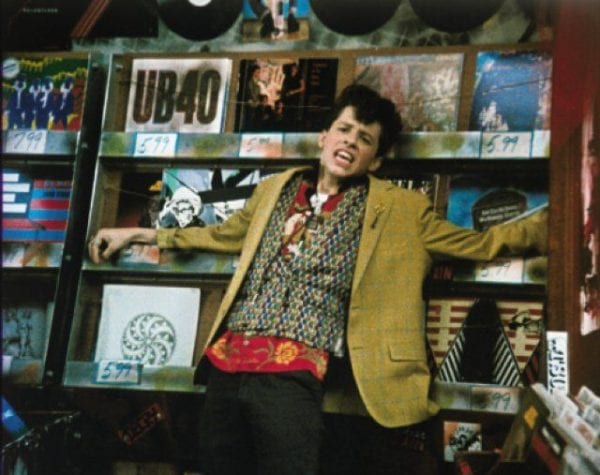
I’d be remiss not to add that Hughes deferred to the mandate of his Hollywood producers when he rewrote his script for Pretty in Pink. His geeky friend-zone-relegated Duckie (played by Jon Cryer) would not wind up getting the girl at the end as he envisioned. Apparently, test audiences disapproved. Still, my friends and I just loved Duckie, especially when he pours his entire being into a lip-synch to Otis Redding’s “Try a Little Tenderness.” The older, ultra-cool store owner, played by Annie Potts, a queen of beatnik kitsch, selects the tune and Duckie makes it the most memorable scene in the film, but pouty Ringwald is not that impressed. She is in love with the milquetoast but amiable rich boy played by Andrew McCarthy, who ultimately leaves the prom with Ringwald. While we teens were smitten with the charming and witty nerd played by Cryer, we weren’t allowed to let go of our Cinderella fantasies. This, after all, was two decades before the heroines in Disney movies like Maleficent and Frozen were quite content to be uncoupled at the end of their stories.
Hollywood took for granted just how much we loved the lovable geeks in Hughes’ films. In my freshman year, I recorded Sixteen Candles on the family’s VCR and recited the lines from Anthony Michael Hall’s king of the geeks, Farmer Ted, who in my opinion, made the movie. He dispenses snarky bon mots as if Dorothy Parker reincarnated into his gaunt, braces-wearing body. His expressions and physical comedy are also comedy gold.
“Relax, would you?” Ted commands. “We have seventy dollars and a pair of girls underpants. We’re safe as kittens.”
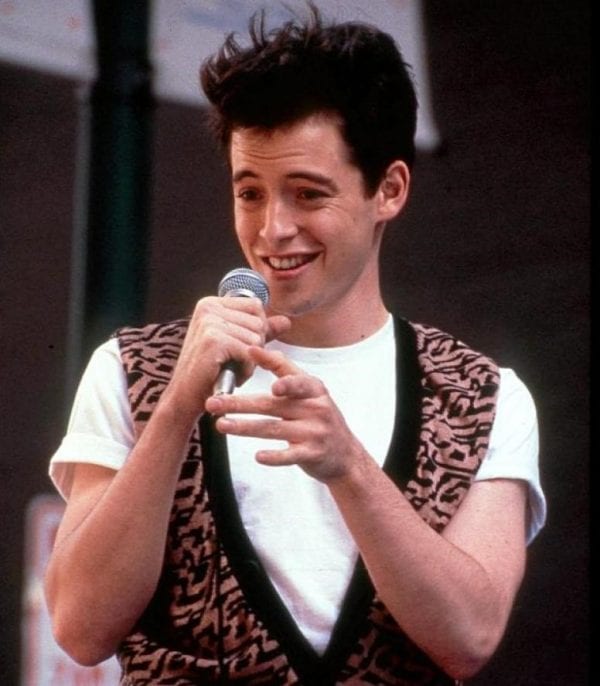
A few years later, in my senior year, Matthew Broderick croons “Danke Schoen” in a parade while skipping school in Ferris Bueller’s Day Off. The sly wit and antics of the popular rebel broke the mold for youth icons: He’s egalitarian, babyfaced and fashionably new wave. Speaking of the music of the time, John Hughes always included UK hits that my friends and I loved but weren’t played on FM radio (at least in our market). The instrumental version of The Smiths’ brooding “Please, Please, Please Let Me Get What I Want” plays over the film’s museum montage, and the final scene with Dream Academy’s “Edge of Forever” got my heart pounding. Most of all, I was enamored with his carpe diem attitude — “Life moves pretty fast,” he says into the camera. “If you don’t stop and look around once in a while, you could miss it.” Evan, I think you can relate to that.
Plus, my hormones were all a-flutter. I went to see Ferris Bueller’s Day Off five times at the theater and thought for sure I’d marry Broderick one day. Even today, I can appreciate how funny the movie is and will watch it time to time. Ferris made us creative/theater geek/artist-type misfits flip the script on our alienation and validated us as social mavericks.
This brings up a question: Do you think it’s harder to be different this decade? As a middle-aged woman, I’ve had to cope with feeling invisible as well as physical changes, less sleep and, as a result, slower thought processes. I’ve had to take time to myself to realize which observations about the outside world have some validity and which ones are projections. I’ve had to learn to live within my set of limitations, but also to challenge myself to get more active and balance my diet, walk outside in nature to gain perspective (like you with your beloved trees, Evan). As I turn 50, I’m coming of age, too. I guess if we’re thoughtful humans, we’re always coming of age.
In this decade called the teens or tens — I’m not sure what it’s actually called — our flaws are out in the open and documented — as if the act of putting thoughts to words and pixels make them so much bigger and more important than they are.
It’s all so intimidating and daunting for young people, but as the you’ve said a million times, “No one should have any doubt that it matters that they are here.”
Even though much of your struggle is set to music, it isn’t corny like an after-school special — what I feared at first. (Refer to Wikipedia so you and your peers can know more about what we more analog older folks grew up with).

Your generation is dealing with problems mine didn’t: high-profile suicides and mass shootings, rampant corruption, deregulation of industries. And perhaps, worst of all, the isolation influenced by social media. The barriers social networking imposes toward connection with people outside your immediate circle are especially challenging for people with non-neurotypical predispositions — those among us who live on the spectrum of anxiety disorders, depression, ADHD, bipolar “disorder” and other arbitrarily labeled ways of thinking and feeling. It’s so easy to shun anyone deemed as defective from a social circle. It just takes one judgmental jerk to spoil the bunch.
A balance of self-awareness and conformity and occasional disregard and rebellion is not only optimal for living a happy life but a necessary survival skill for many. “To thine self be true,” indeed, but to a point and in the right measure and setting.
The current paradox Dear Evan Hansen brings up is that if we abide by the constructs of social media to deliver a message against oppression, we also perpetuate the oppression of social media.
Then again, as the play also shows us, norms can be malleable. We can transcend labels, redefine them and defy oppression in the multimedia age. Mental illness is slowly becoming de-stigmatized. Children like Connor are treated less like pariahs and shuffled from one facility to another. Children around the world are even organizing protests and taking ownership of their future. They’re bringing attention to issues their seniors are ignoring: the lax regulation of guns and appeal for attention toward climate change.
Prejudice toward mental illness and alternative cognitive predispositions is one of the biggest hurdles we still need to jump. Just as you were treated as an oddball for your phobias instead of celebrated for above-average insight; just as Connor Murphy was called a freak because his brain, like other parts of his body, was not working the way it was designed to, it shouldn’t mean that we have to continue the accepted norm of labeling and denigration of those we deem inferior for reasons that aren’t even fully or accurately understood.
It’s highly debatable whether we could ever have a society without shaming, but what I love about Dear Evan Hansen is how it shows us we can all survive unthinkable embarrassment and reinvent ourselves.
It isn’t easy. It’s quite messy. But highly doable.
Thanks for your time, Evan. See you in the movie.
Friends forever,
Julie Garisto


